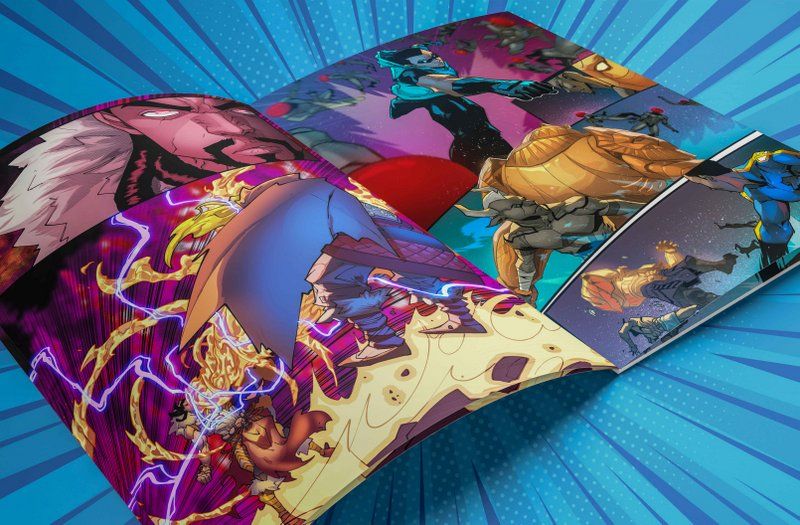“Passion or exploitation? Behind the glossy comic covers, many young artists say they’re overworked, underpaid, and undervalued.”
The Dream and the Reality
If you talk to most young Nigerian artists, their dream is simple: draw for a living.
They want to sketch superheroes, build worlds, and create the next Black Panther moment for Africa.
But behind that dream is a harder reality. Many comic studios across Lagos, Abuja, and Ibadan are powered by young, passionate creatives sometimes university students or fresh graduates who put in hours upon hours for little to no pay.
Some are called “interns” for years. Others are promised “exposure” instead of money.
And while some studios are genuinely struggling financially, many artists are starting to ask: At what point does passion cross into exploitation?
Why Young Artists Are Easy Targets
Let’s be honest, talent is everywhere. Walk into Yaba College of Technology, UNILAG, or even online art communities on Instagram and Twitter, and you’ll see dozens of young Nigerians posting mind-blowing illustrations.
The supply is massive, but the jobs? Very few. That oversupply means studios can set the terms.
Need a colorist? There’s always someone willing to work for free “just to get experience.” Want interns?
A single WhatsApp broadcast will get you 50 eager applicants. With that kind of power dynamic, it’s easy for exploitation to creep in.

The Studios’ Defense
To be fair, not all studios are villains twirling their mustaches. Many Nigerian comic companies themselves are bootstrapped, with no investors, no grants, and no steady income.
Unlike Nollywood or Afrobeats, there’s no Spotify or Netflix-like pipeline pouring money into comics yet.
Studio owners argue they’re taking huge risks, spending personal savings, and often can’t even pay themselves.
“If there’s no money in, how do we pay artists?” one Lagos-based studio head asked at a panel during Lagos Comic Con.
From their perspective, offering a platform, mentorship, and credits is better than offering nothing. Some argue it’s part of “paying dues” in a new industry.
Stories From the Trenches
But scroll through X (Twitter), and you’ll see another side. Anonymous threads often pop up, with young artists complaining of:
Working 12-hour days for ₦20,000 a month.
Promised “payment after sales,” only for the comic never to be printed.
No contracts, no royalties, no ownership of the art they created.
Being dropped without notice once “free labor” wasn’t needed anymore.
In a panel at the just concluded IBADAN FAN EXPO earlier this year, a young artist accused a mid-sized studio of using interns as a “free workforce” to churn out comics faster.
This sparked a heated debate: was this exploitation, or just the growing pains of an underfunded industry?
Global Comparison
This isn’t just a Nigerian problem. Even in Japan’s manga industry, assistants often work in brutal conditions for low pay, with only a few making it big.
In the U.S., comic book freelancers constantly complain about late payments from even big publishers.
But the difference is that those industries are already billion-dollar machines. Nigeria’s comic space is still in its infancy.
Which raises the question: if exploitation is already a trend now, what happens when money does come in? Will artists be protected, or sidelined?
The Way Forward
So, what can change? Here are three key shifts:
Contracts & Transparency: Even if the pay is small, studios must be upfront. A written agreement is better than vague promises.
Artist Collectives: Young artists can form unions or associations to protect their rights, similar to how musicians created PMAN (Performing Musicians Association of Nigeria).
Multiple Income Streams: Studios should explore merchandising, crowdfunding, or Webtoon distribution to create revenue that allows fairer pay.
Some creators are already finding ways out. Freelance Nigerian artists are working directly with international publishers via platforms like Upwork, Fiverr, or even Twitter commissions, bypassing local studios entirely.
Others are building their own mini studios, choosing collaboration over exploitation.
The Debate: Passion vs Exploitation
The conversation is messy. On one hand, without young artists willing to grind for little, many Nigerian studios wouldn’t exist today.
On the other, if passion keeps being undervalued, the best talents will leave either for animation studios, advertising agencies, or freelance gigs abroad.
At the heart of it is one big question: is this just a “rite of passage” every creative industry goes through, or is Nigeria setting itself up to burn out its most talented people before comics even take off?
Over to You
So, are Nigerian comic studios building opportunities or burning bridges?
Are they grooming the next big names or exploiting dreams in the name of “exposure”?
Maybe the truth is somewhere in between.
What do you think? Have you or someone you know worked in a Nigerian comic studio?
Was it a stepping stone or a nightmare? Share your story the industry is watching.